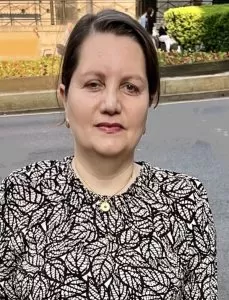State, Elites and Sovereignty in Modern Iran
Free Conference
Saturday, July 22, 2023 – 8:30 am
Innis Town Hall Theatre

Firouuzeh Kashani-Sabet is Walter H. Annenberg Professor of History at the University of Pennsylvania. Her new book, Heroes to Hostages: America and Iran, 1800-1988, will be published by Cambridge University Press this summer.
Abstract
Sacrifice and Service: Dr. Farrokhrou Parsa and the Iranian Women’s Movement
On 8 May 1980 Dr. Farrokhrou Parsa was summarily executed in the aftermath of the Islamic Revolution. Accused of spreading corruption on earth, Parsa’s purported crimes included her support for women’s secular education. Parsa had served as the minister of education under the premiership of Amir Abbas Hoveyda, another prominent politician of the Pahlavi era also killed after the revolution. During her tenure Dr. Parsa played a vital role in enabling women’s participation in the public sphere and in expanding women’s literacy and education.
From the early days of the constitutional revolution in 1906, Iranian modernists had called for women’s empowerment. The forces of tradition and modernity battled one another not only over dress, but education, employment, and voting. Haunted by women’s lack of agency, some celebrated the unveiling directive of 1936 because for some this act represented the removal of various barriers to women’s upward mobility in Iranian society. For others, mainly religious figures and their families, the unveiling decree was a “rape of Islamic tradition.” Conservative women found their freedoms curtailed because they did not feel comfortable venturing into the streets unveiled. After the fall of Reza Shah in 1941, his son, Mohammad Reza Pahlavi moved away from mandatory unveiling and gave women the choice to veil. However, the empowerment of women did not proceed in unencumbered fashion. This essay considers the life and contributions of Dr. Parsa in this contested history.